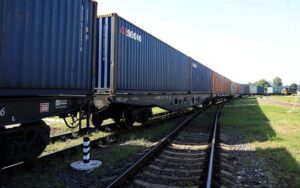
JSC Ukrzaliznytsia, taking into account the material losses inflicted on Ukraine by the Russian Federation and Belarus, will not return their freight cars to Russian and Belarusian owners, Deputy Director of the Department of Commercial Work of Ukrzaliznytsia Valeriy Tkachev said on his Facebook page on Thursday night.
According to him, over the past 24 hours, the owners of Belarusian and Russian railcars began to contact the Center for Transport Logistics of Ukrzaliznytsia with demands for redirection and return of their rolling stock, which is now in Ukraine.
“Looking at the material damage caused to Ukraine – the aggressor country (Russia) and its ally (Republic of Belarus); and most importantly, given the thousands of innocent victims killed by the invaders… all rolling stock, cargo and other things will not be returned to the occupying countries!” Tkachev said.

The Verkhovna Rada of Ukraine adopted the law on ratification of the protocol between the government of Ukraine and the government of the Republic of Belarus on amendments to the agreement between the government of Ukraine and the government of the Republic of Belarus on international road traffic of December 17, 1992 (No. 0060).
The relevant document was supported by 281 MPs.
The Ministry of Infrastructure noted that this law will liberalize the conditions for carrying out freight traffic between Ukraine and Belarus, free irregular passenger road transport from the licensing system, and also unblock the work of Ukrainian road carriers in the Baltic and Scandinavian directions.
“The lack of the required number of permits from Poland and Belarus, additional conditions for transit through Russia led to a situation in which Ukrainian exporters were virtually cut off from the markets of Lithuania, Latvia, Estonia and Finland. Only due to the lack of Belarusian permits, the loss of income of carriers in November-December this year should amount to UAH 1 billion. If we also take into account the needs of producers, then the actual losses for the country would be even greater. Today, the parliament defended Ukraine’s national interests in the international freight market and protected Ukrainian exports,” Deputy Infrastructure Minister Mustafa Nayyem is cited on the ministry’s Facebook page.

When calculating the updated electricity forecast balance, the Ministry of Energy of Ukraine does not consider the import of a resource from the Russian Federation and Belarus, First Deputy Energy Minister Yuriy Vlasenko has said.
“When calculating the forecast balance, we do not envisage the import of electricity from Russia and Belarus,” he said on the margins of the energy forum in Kyiv, organized by Energy club, on Wednesday.
At the same time, he drew attention to the fact that imports are prohibited until October 1, but are not considered in the future.
At the same time, Vlasenko said that a feature of this autumn-winter period will be the operation of the Integrated Power System, as well as Burshtyn TPP energy island in an isolated mode, providing for their disconnection from all power systems.
“We need to work this way for three days in winter and summer. As for winter, we are also working on it with Ukrenergo, when we will work in an isolated mode – in late January or early February,” Vlasenko said.

The Belarusian air carrier Belavia has extended the suspension of all of its flights to Ukraine until September 30, 2021, in line with a similar decision adopted by Ukraine, the Belavia press service told Interfax.
“The Ukrainian side informed us of the extension of its ban on Belavia flights until September 30, 2021. This is their official position. Consequently, the suspension of all fights to Ukraine has also been extended. We can’t say at this point how the situation will unfold in the future,” the press service said.
As reported, due to the Ukrainian authorities’ ban on Belavia’s flights, the Belarusian air carrier had to cancel its flights to Ukraine between May 26 and August 25 of this year.
European Union member states, Ukraine and some other countries prohibited Belarusian airlines from passing through their airspace in late May due to the Ryanair flight landing incident in Minsk. Thus, Belavia has lost access to more than two-thirds of passenger destination countries after it was banned from using the airspace of a number of countries.

The first transaction for the export of milk powder to Ukraine has been completed at the Belarusian Universal Commodity Exchange (BUCE), the press service of the BUCE has reported.
“Following the trading session, a Ukrainian company purchased from a Belarusian manufacturer a trial batch of 40 tonnes of skimmed milk powder for $108,000. Earlier, Ukrainian participants mainly purchased scrap metals, construction materials, flour and plant seeds at the BUCE, and showed no interest in domestic dairy products,” the press service said.
The first deal on the purchase of Belarusian milk powder by the Ukrainian company on the stock exchange is considered a landmark event in terms of export diversification.
“This, first of all, was facilitated by the active work of the exchange to attract new buyers from Ukraine to the auction. In particular, the company that completed the transaction is a large importer of agricultural products to the Ukrainian market. On the other hand, an important role was played by the flexible marketing policy of Belarusian dairy processors, who were able to offer their products at a competitive price. As practice shows, a trial purchase is usually followed by transactions of a much larger volume. We look forward to a similar scenario in this case,” the press service said.
They also noticed that Ukraine is in the top five countries in terms of the number of companies accredited on the exchange.
“At the same time, in the first half of the year, the number of Ukrainian participants increased by 16% and amounted to 326. Exchange trade turnover with Ukraine has also significantly increased: following the results of the six months, it reached $24.6 million, which is 58% more than in the same period in 2020,” the report says.
In general, in the first half of 2021, the export of milk powder through the BUCE increased by 4.5 times. The main buyers were residents of the Russian Federation.

The Interdepartmental Commission on International Trade has extended for five months the antidumping investigation into Ukraine’s import of plywood originating from Belarus, initiated on June 22, 2020.
The decision of the commission of July 13, 2021 to initiate an investigation comes into force from the moment of its publication, it is indicated in the notification published in the Uriadovy Kurier newspaper dated July 23.
“The commission, in accordance with the adopted decision, decided to extend the antidumping investigation into the import of plywood originating from the Republic of Belarus to Ukraine by 18 months,” the notice says.
As reported, the said antidumping investigation, the decision on which entered into force on June 25, 2020, was initiated by Ukraine on the basis of complaints from Ukrainian companies, namely Kostopil Plywood Plant LLC, Ukrhosptovary Private Enterprise, Uniplit LLC, Standard 2002 LLC, Start production cooperative.
According to the applicants, during the observation period up to the third quarter of 2019, the share of plywood imports from Belarus increased in absolute terms by 691%, in terms of consumption – by 559%, and production – by 858%. At the same time, the price of imported plywood was higher than the price of the applicant (except for 2016-2017), which led to a negative trend in its performance in the domestic market.